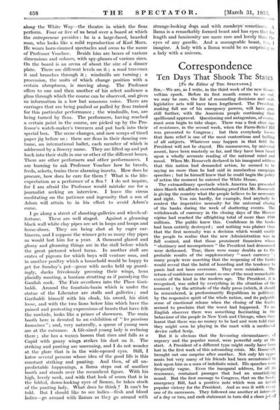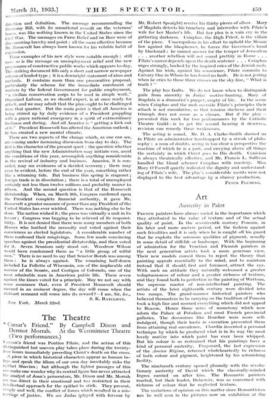Correspondence
Ten Days That Shook The States
[To the Editor of THE SPECTATOR.] S1R,—We are, as I write, in the third week of the new Roose. veltian epoch. Before its first month comes to an end, we may be sure, the list of resounding decisions and swift legislative acts will have been lengthened. The President, making full use of his emergency powers, will have gone still further, with the American people continuing their spellbound approval. Questioning and antagonism, of course, must soon begin to take shape. There was a first clear sign of resistance, in the second week, when the Farm-Relief Bill was presented to Congress ; but then everybody knows that farm relief is one of the most contentious and baffling of all subjects. Whatever may happen in that field the President will not be stayed. His manoeuvres, by universal assent, have been masterly so far, and they have been based upon a wholly accurate reading of the national mind and mood. When Mr. Roosevelt declared in his inaugural address that this nation had demanded action, he seemed to he saying no more than he had said in numberless campaign speeches ; but he himself knew that he could begin the policy of action the moment he entered the White House.
The extraordinary spectacle which America has presented since March 4th affords overwhelming proof that Mr. Roosevelt is giving the country what the people believe to be necessary and right. You can hardly, for example, find anybody to contest the imperative necessity for the universal closing of the banks during the week of shattering events. The withdrawals of currency in the closing days of the Hoover regime had reached the affrighting total of more than $700 millions. The public knew this. Confidence in the banks had been entirely destroyed ; and nothing was plainer than that the first necessity was a decision which would enable the people to realize that the new Administration was in full control, and that those prominent financiers whose " obstinacy and incompetence " the President had denounced were dethroned. True, there were many doubts as to the probable results of the supplementary -" asset - currency " ; many people were asserting that the reopening of the banks would reveal that the habit of hoarding and the tendency to panic had not been overcome. They were mistaken. The return of confidence must count as one of the most remarkable events of the kind in the modern age. The President, it is recognized, was aided by everything in the situation of the moment : by the attitude of the daily press (which, it should be remembered, is predominantly Republican in polities) ; by the responsive spirit of the whole nation, and its palpable sense of emotional release when the closing of the banks seemed to proclaim that the worst had happened. To au English observer there was something fascinating in the behaviour of the people in New York and Chicago, when they learnt that there was no money to be had and were told that they might soon be playing in the mart with a mediaeval device called Scrip.
But it is obvious that the favouring circumstances, of urgency and the popular mood, were powerful only at the start. A President of a different type might easily have been lost in the first week of this astounding crisis. Mr. Roosevelt brought out one surprise after another. Not only his oppo- nents but very many of his friends had been accustomed to look upon him as a man of indefinite mind. His speeches were frequently vague. Even the inaugural address, for all itg resonance, contained passages that had an unsatisfying sound. But the first message to Congress, that on the bank- emergency Bill, had a positive note which won an initial popular victory for the President. And so was it with every one of its successors. They followed one another at intervals of a day or two, and each statement in turn did a clean job of direction and definition. The message recommending the Economy Bill, with its sensational assault on the veterans' bonus, was like nothing known in the United States since the Civil War. The messages on Farm Relief and on Beer were of disconcerting brevity and point : all the more effective because 3Ir. Roosevelt has always been known for his voluble habit of expression.
These examples of his new style were notable enough : still more so is the message on unemployment relief and the new programme of constructive public works which appears to-day. This striking document fills only a short and narrow newspaper column of leaded type ; it is a downright statement of aims and methods. It contains more than one provocative proposal, particularly the scheme for the immediate enrolment of workers by the federal Government for public employment, " a civilian conservation corps to be used in simple work." Organized Labour, as we should expect, is at once ready for attack, and we may admit that the plan ought to be challenged from that quarter. But the main point is that all America is being stirred up by daily evidence of a President grappling with a grave national emergency in a spirit of extraordinary freshness and daring. And all America is " getting a kick out of it." President Roosevelt has altered the American outlook ; he has created a new mental climate.
There are two aspects of the change which, as one can see, are coming under increasing discussion from day to day. The first is the character of the present spurt ; the question whether anything that the new Administration may initiate can, amid the conditions of this year, accomplish anything considerable in the revival of industry and business. America, it is con- ceded, may see evidences of a decided recovery ; there may even be evident, before the end of the year, something rather like a returning tide. But business this spring is stagnant ; foreig,n trade is in dissolution ; there is a total of unemployed certainly not less than twelve millions and probably nearer to fifteen. And the second question is that of the Roosevelt dictatorship. - When, on March 9th, Congress conferred upon the President complete financial authority, it gave Mr. Roosevelt a greater measure of power than any President of the United States has ever wielded. There was nothing else to be done. The nation wished it ; the press was virtually a unit in its favour ; Congress was begging to be relieved of its responsi- bility. It is not denied that there were many members of both Rouses who loathed the necessity and voted against their consciences as elected legislators. A considerable number of them confessed their misgivings. Some few made convincing speeches against the presidential dictatorship, and then voted for it. Seven Senators only stood out. Woodrow Wilson would have condemned them as " a little group of wilful men." There is no need to say that Senator Borah was among them : he is alWays against. The remaining half-dozen included La Follette of Wisconsin, son of the implacable old warrior of the Senate, and Costigan of Colorado, one of the most admirable , men in American public life. These seven against the times voted for a principle. May we not say with some assurance that, even if President Roosevelt should succeed in an eminent degree, the day will come when the stalwart remnant will come into its reward ?—I am, Sir, &c., New York. March 22nd. S. K. RATCLIFFE.









































 Previous page
Previous page